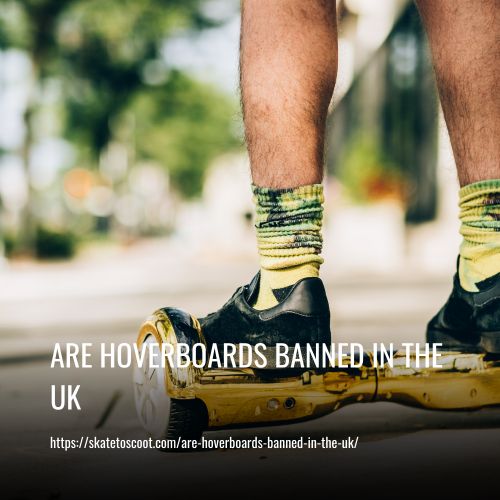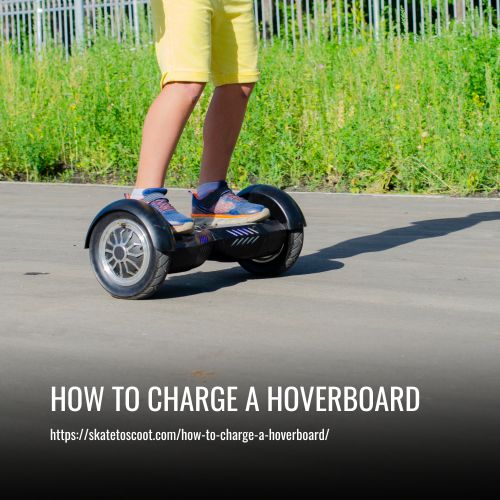As an Amazon Associate we earn from qualifying purchases.
No, hoverboards are not banned in the UK. However, there are legal requirements that must be met in order to use them on public roads, cycle lanes, and other areas. They are considered powered transporters and require a vehicle approval certificate, compliance with safety standards, and third-party insurance.

A Closer Look At The Law
A closer look at the UK hoverboard ban reveals the comical nature of the situation. The ban is not recent, but rather an almost 200-year-old law that prohibits their use in public spaces. The Highways Act of 1835 is to blame, as it states that those who drive “Carriage of any Description” on the road will be penalized.
This includes hoverboards which are classified under objects such as sheep and cattle. Only licensed and insured motor vehicles and users can legally use roads, and hoverboards do not meet these requirements. This brings up questions about why electric bikes are allowed on the roads when it’s also small gadgets. This issue is in a grey area, as new inventions require new regulations. The lack of regulation underscores the need for clarification to keep riders safe.
The Good News – Law Reconsideration
The UK Department for Transport (DfT) released a document called Future of Mobility: Urban Strategy on March 19th, 2019. The document aims to make the United Kingdom a world leader in mobility innovation. As part of this plan, the DfT will review the 1835 Highways Act to modernize transport laws.
Although no set date has been given for its completion, it could take several months to finalize. However, this reconsideration of laws is welcome news to those concerned about the legality of hoverboards in the UK. There is hope that new laws will fall into place, making hoverboards legal for use in public spaces, including cycle lanes.
Until this legislation is enacted, hoverboard users should only use their vehicles on private land. The road to change is a process, and there is optimism that alternative forms of transport like hoverboards will one day be a normal means of commuting.
Why are hoverboards considered a problem in public places legally?
Hoverboards, along with other powered electric rides, are considered a problem in public places legally because they are not insured, which means that any damages or injuries caused by a hoverboard rider would not be covered financially. This is the main point of contention according to the law.
If a hoverboard rider crashes into a car, a person, someone’s property, or a pram, the damages would have to be paid for out-of-pocket. The law surrounding hoverboards can be found in documents dating back over a hundred years. As a result, hoverboards are currently banned from public roads and cycle lanes in the UK, although they can be used on private land with the landowner’s permission.
Safety concerns have also been raised, leading to legal requirements for safe clothing and standards of driving. There are alternative transport methods available, such as electric bikes and compact cargo bikes, which have undergone the necessary safety standards and are approved in the British Vehicle Approval Scheme. Law enforcement and trading standards are responsible for ensuring that electric rides, including hoverboards, meet safety and legal requirements.
How a 180-year-old law affects where you can ride your hoverboard
Did you know that hoverboards could be breaking a 180-year-old law in the UK? Section 72 of the Highway Act of 1835 states that it is illegal to ride “upon any footpath or causeway by the side of any road made or set apart for the use or accommodation of foot passengers.” This law also includes the leading or driving of any animal or vehicle on footpaths or causeways.
Hoverboards fall under the category of vehicles and can be fined up to level 2 for each offense. It’s worth noting that this outdated law was established long before the invention of hoverboards, and there is no specific mention of them. However, it is still being used today to prosecute those who ride or travel on them in areas designated for pedestrians.
Currently, there is little clarification on how this law applies to powered transporters, and there is a need for a review to incorporate modern devices such as hoverboards. In the meantime, those who use them should be aware of the potential fines and choose alternative transport methods when necessary to avoid breaking the law.
So, are hoverboards completely banned in the UK?
Hoverboards are not completely banned in the UK. Unlike some countries, self-balancing boards are still legal and can be purchased and ridden in certain areas, such as private property. That being said, there are legal requirements for using a hoverboard in public areas and on roadways.
Hoverboards are considered “powered transporters” and are subject to the same rules as electric bikes and scooters. This means that riders must be at least 14 years old, wear a helmet, and have third-party insurance. Additionally, hoverboards are not allowed on cycle lanes or footpaths and can only be used on the road if there is no other option.
While there have been concerns about the safety of hoverboards and accidents have been reported, there have been no official bans on their use. Overall, while hoverboards are not completely banned, riders should be aware of the legal requirements and safety concerns before using them in public areas.
Where Can You Ride Hoverboards in the UK?
Hoverboards are becoming increasingly popular, and people are questioning the legality of using them in the UK. So, where can you ride a hoverboard in the UK? It is illegal to ride a private hoverboard on public roads and footpaths. However, it can be used on private property or in hoverboard parks.
It is also allowed in private gardens and in your own house. The UK law may be relaxed in the future, especially since electric scooters have become a popular means of commuting during the pandemic. The government is looking for ways to minimize the risks of hoverboard use, and manufacturers are expected to prioritize safety during production. Until then, it is important to adhere to current laws and use hoverboards only in permitted areas to avoid penalties.
FAQs
Yes, certain types of hoverboards were banned in the UK in 2015 due to safety concerns over their electrical components and fire hazards. However, since then, hoverboards meeting safety standards have been approved for use.
Hoverboards that meet the safety standards outlined by the British and European safety authorities, such as CE certification, are permitted. These hoverboards should have undergone rigorous testing to ensure they are safe to use.
Legally, hoverboards can be used on private property with the landowner’s permission. They cannot be ridden on public roads, pavements, or cycle lanes in the UK.
If caught riding an illegal hoverboard in public spaces, individuals can face fines and have their hoverboards confiscated by law enforcement.
Legal hoverboards in the UK should have a CE mark on them, indicating they meet safety standards. Additionally, they may have other certifications or labels verifying their compliance with safety regulations.
While there are no specific age restrictions, it’s recommended that hoverboards should be used by individuals who have the necessary balance and coordination to operate them safely. Parents should supervise young riders and ensure they wear appropriate safety gear.
Conclusion:
While there are some restrictions on hoverboards in the UK, they are not completely banned. It’s important to be aware of the rules and regulations surrounding their use, but don’t let that discourage you from enjoying this fun and innovative mode of transportation.
As always, safety should be your top priority, so make sure to wear protective gear and follow the guidelines for safe hoverboard use. Happy riding!
Amazon and the Amazon logo are trademarks of Amazon.com, Inc, or its affiliates.



